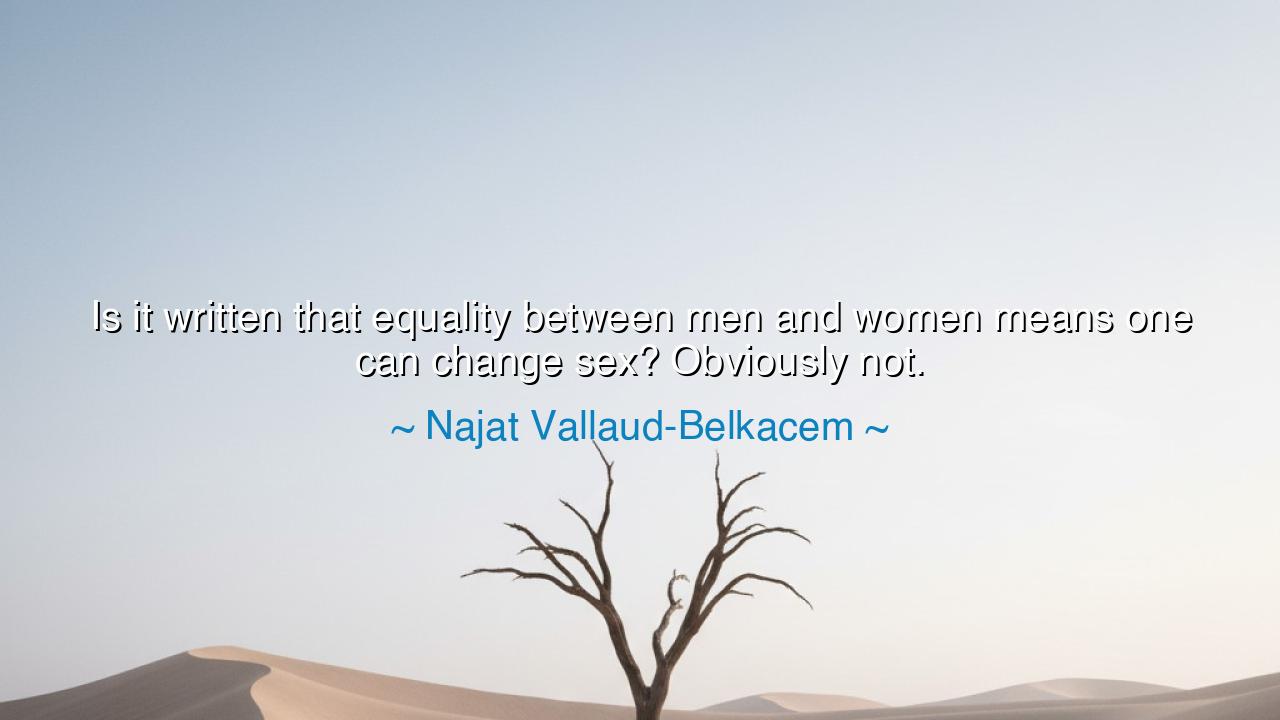
Is it written that equality between men and women means one can
Is it written that equality between men and women means one can change sex? Obviously not.






In the words of Najat Vallaud-Belkacem, “Is it written that equality between men and women means one can change sex? Obviously not.” These words stand as both a question and an answer, a reminder that the struggle for equality has often been misunderstood, misused, or confused. They call us back to clarity: to recognize that equality is not about erasing difference, nor dissolving identity, but about honoring the dignity and worth of both man and woman as they are. Her declaration resounds like the voice of a guardian of ancient truths, urging us not to wander into false paths while seeking justice.
The ancients, too, wrestled with the meaning of balance between the sexes. They saw the world as a dance of opposites: sun and moon, fire and water, man and woman. To deny this duality was to deny the order of nature itself. Yet they also spoke of harmony, not domination. The Greeks told of Hera and Zeus, whose marriage, though stormy, embodied the eternal negotiation of masculine and feminine power. Likewise, in many traditions, the feminine was not lesser, but sacred—goddess, mother, protector, creator. Equality, in its truest form, was not sameness, but the acknowledgment that both halves of creation hold equal weight in the scales of destiny.
What Vallaud-Belkacem reminds us is that equality must not be mistaken for the denial of essence. To say that men and women are equal is not to say they are identical. Rather, it is to affirm that they are equal in worth, equal in rights, equal in the dignity of their humanity. History shows us how often this truth has been forgotten. In Rome, women were barred from power, their voices silenced, their property controlled by men. Yet in that same empire, women like Livia, Agrippina, and Julia Domna shaped politics and philosophy through influence, intellect, and resilience. They did not need to become men to wield power; their strength lay in the assertion of their own place.
There is a lesson also in the life of Florence Nightingale. She entered a world where women were expected to be silent, confined to the household. Yet she did not change her sex nor deny her womanhood to rise. She embraced it, and in doing so transformed the very nature of medicine and compassion. She showed that equality does not demand sameness, but recognition—that the power of women, different though it may be in form, is no less great in impact.
The heart of this teaching is balance. To confuse equality with the erasure of differences is to lose the richness of life’s design. True equality lifts both men and women by affirming their humanity without demanding that they forsake their nature. The warrior and the nurturer, the thinker and the dreamer, the father and the mother—these roles may shift and intertwine, but their existence proves the beauty of complement, not contradiction.
Thus, the lesson for us is clear: seek equality not by denying who you are, but by demanding respect for what you are. Let no woman think she must become a man to lead, nor any man believe he must forsake his strength to show tenderness. The path to justice lies in honor, not mimicry. It is in the recognition that diversity of form does not mean inequality of value.
Practically, this means raising daughters and sons to honor one another, not as rivals, but as companions. It means building marriages and partnerships not on domination, but on shared respect. It means shaping laws and institutions that guard fairness without erasing difference. Above all, it means remembering that equality begins not in proclamations, but in the way one human being looks upon another—with dignity, with reverence, with the acknowledgment: you are as valuable as I am, though you are not the same as I am.
So let these words of Najat Vallaud-Belkacem be carried forward as a shield of truth. Equality is not the denial of difference; it is the celebration of shared humanity. Let us walk with this wisdom, that men and women together may stand as equals—different in form, yet united in worth, joined not by sameness, but by mutual respect and eternal dignity.






AAdministratorAdministrator
Welcome, honored guests. Please leave a comment, we will respond soon